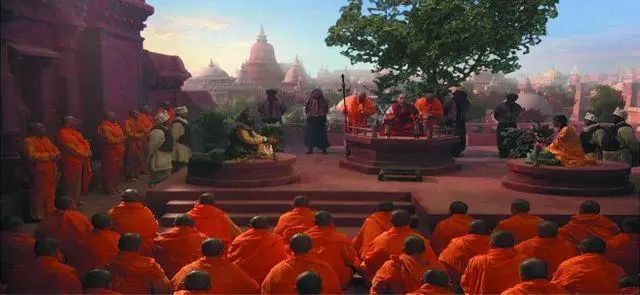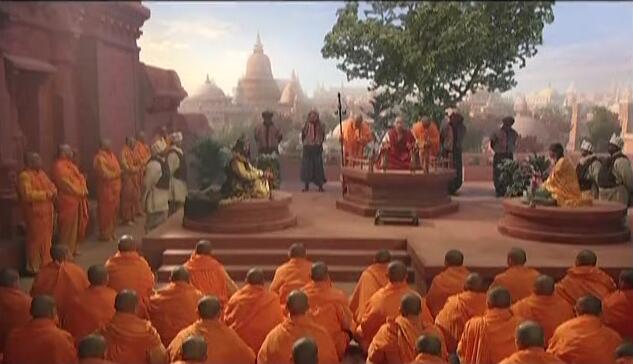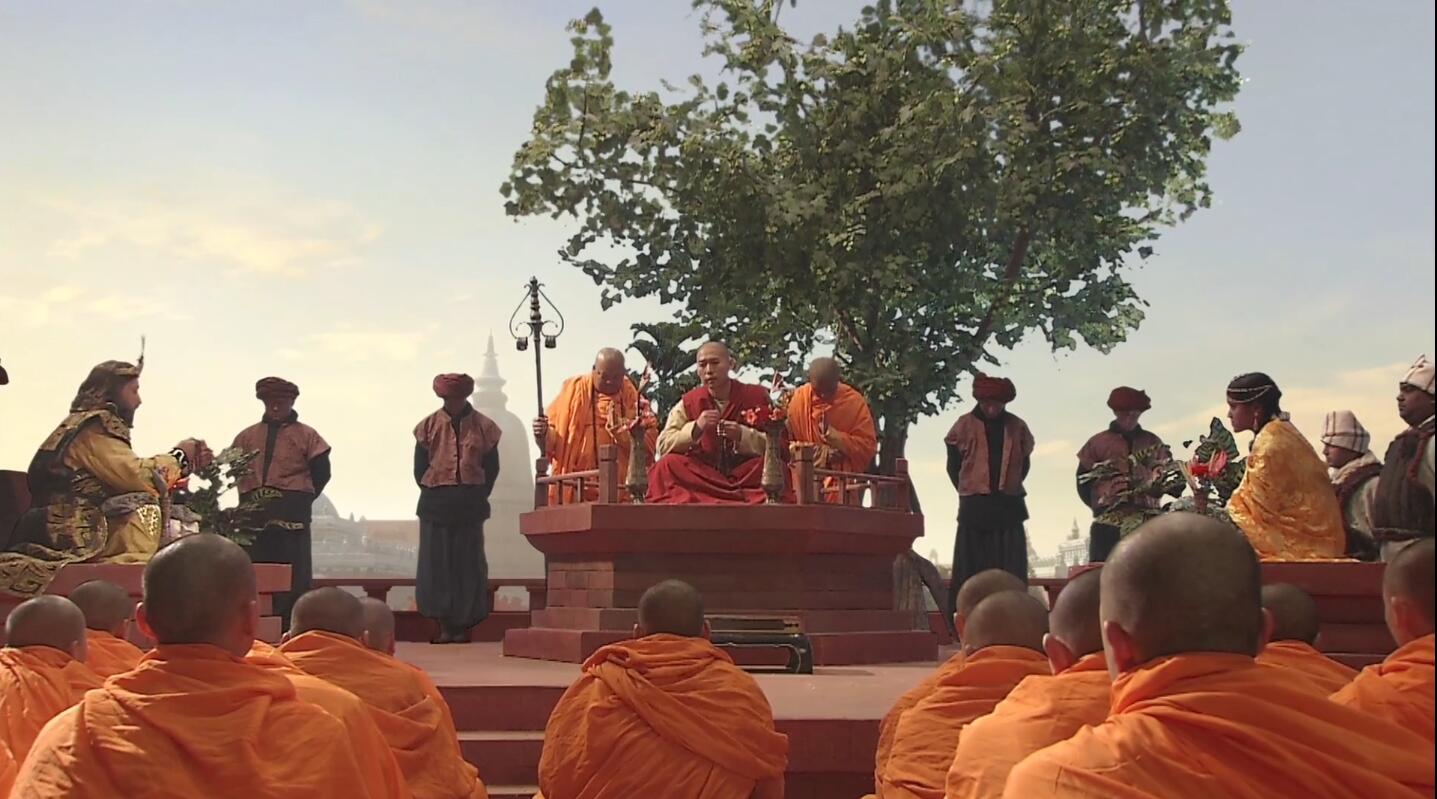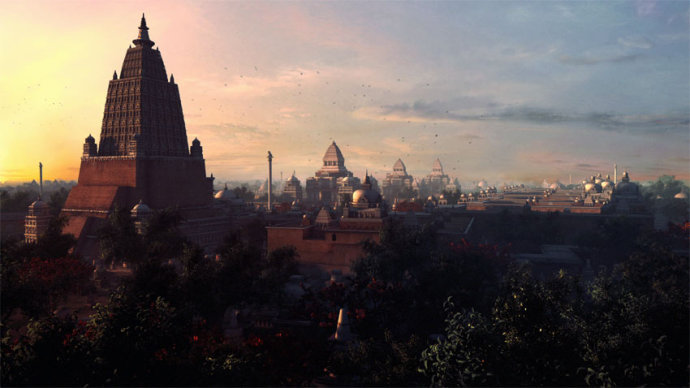DepthReading
Xuanzang’s Journey to the West: A Hard Spiritual Pilgrimage
The night when Xuanzang left Chang'an was long ago. He was experiencing an arduous spiritual pilgrimage, normaly starting at dawn and stopping at night, and going through the rigors of living in the wilderness. The farther he was away from Chang'an, the more desolate the surrounding was.
Several years had passed since the day when Xuanzang left Chang’an and headed for the West. The destination was still far away. The journey to the Buddhist land was an arduous and long one. He was surrounded by nothing but yellow sands, no trace of human nor that of a horse or camel. The trip was far more difficult than he had expected. There was nothing but the wild desert. He was frustrated and lost, seeing nothing but the road ahead, knowing nothing but the road ahead.
There was no bird in the sky. Though suffering from the intense heat, he was comforted by the cool oasis in his heart, that was, obtaining the Buddhist sutra in the West, which had sustained his long trek over some thousands of miles on foot. His devout faith was not only as bright as the sun, but also as immortal as the sun.
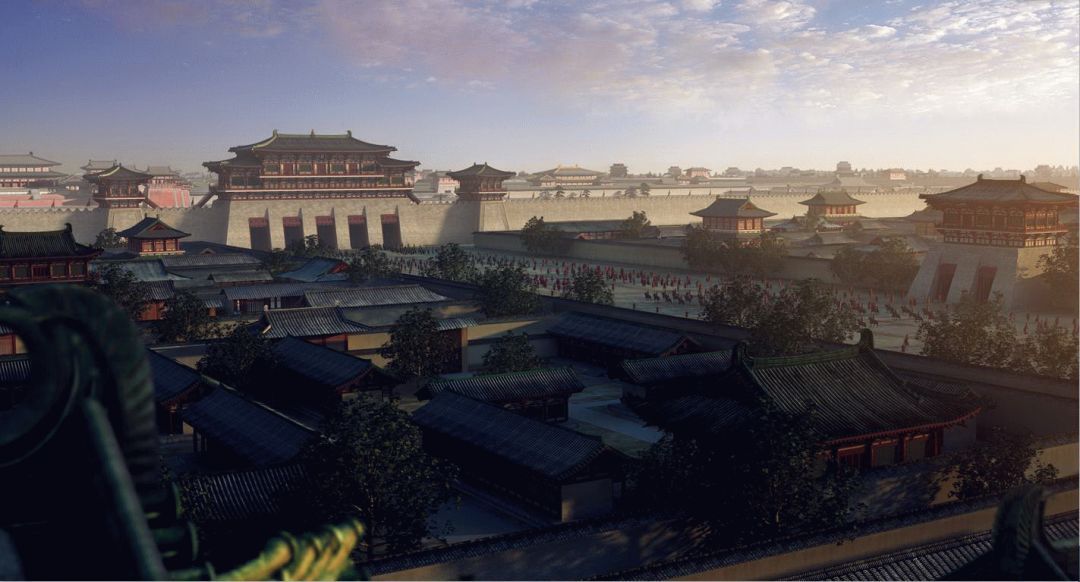 Since the Buddhist scriptures were introduced into China, there were various translations versions of them, and the interpretations were also differentiated. Even for the Cittamatra, there were the northern school and the southern school which were greatly different from each other. After he learned the scriptures in Sanskrit, Xuanzang made a vow to go to India to bring back and translate the original scriptures by himself, so as to unify various Buddhist thoughts in China.
Since the Buddhist scriptures were introduced into China, there were various translations versions of them, and the interpretations were also differentiated. Even for the Cittamatra, there were the northern school and the southern school which were greatly different from each other. After he learned the scriptures in Sanskrit, Xuanzang made a vow to go to India to bring back and translate the original scriptures by himself, so as to unify various Buddhist thoughts in China.
The great ambition was never been allowed by the emperor of his time. However, his will was so strong that he “disobeyed the emperor’s order and went to the West without permission”. Despite the obstacles and the distance, Xuanzang started his pilgrimage at age 29.
He departed from Chang'an, by way of Lanzhou and Guazhou, through Yumen Pass, crossed the five fire beacon towers, and reached the territory then out of the control of the Tang Empire.
Fate greatly challenged him during the journey, but nothing changed his initial will and ambition, despite the fact that the desert under his foot which even scared the devil almost killed him.
Outside the Yumen Pass, the vast Yadan landform of Moheyanqi desert was a grassless barren, with high platforms and pagoda looking like earthen cliffs. Covered by soil mixed with grits and gravels, the bleak world was lifeless. All one could see is endless yellow sands, and it seemed to extend infinitely, without boundaries. Walking in the desert, there were no bird in the sky, and no beast on the land. The lonely traveler could only chat with the wind, and talk to his own shadow. What was more horrible than the mental pressure caused by solitude and loneliness was strong wind, quicksand, high temperature and water shortage. Such extreme geographical weathers were very common there. “At night, wildfires which seemed to be held by ghosts were as bright as the starring sky; at daytime, strong wind blew with sands and then scattered down like rain.” The desert at daytime was terribly hot with wind and sands which made it covered with turbid air filled with smoke. When the wind blew, sands were stirred up and rose from the ground and roared in the sky. At night, the wilderness was lighted with scary shadowy light and fire. There were quicksand rivers in the desert and some kind of invisible beast named Kui. It was said that Kui would tail after travelers closely and even create mirage to confuse travelers. Of course, today we can explain it very well. Mirage is a natural phenomenon caused by a special geographical climate and by long-term physiological and psychological pressures especially during a long lonely journey. However, for Xuanzang, who traveled in the desert thousands of years ago, his fear and horror can hardly be described in words. A more horrible challenge was water shortage in the desert, which often suggested imminent death. The sea of sands was endless, without a trace of human habitation. No one would come to help. People can survive without food for a few days but few if without water. With his lips dry and painful, it was harder than death. Xuanzang suffered from physical tortures with the threat of death, which ordinary people could not stand. “I drank no water for four nights and five days, suffering from thirst and hungry. I thought I was going to die." Trapped in the predicament of the extreme high temperature and water shortage, Xuanzang almost lost his mind. Anxious and almost crazy, he moaned to himself, “I cannot escape death this time”. His cracked lips became white, and the sun-burnt face was as red as painted with copper oil. He supported his body with a stick. Facing death, he looked at the sky desperately. Xuanzang felt that he was going to die in the desert.
In the distance was the whistle of wind from the history.
Time has passed. We knew nothing about how Xuanzang came out of the horrible death valley under extreme physical difficulties, but it is no doubt that without a strong will and a firm faith, he could not accomplish the long and astonishing pilgrimage.
Walking out of the nightmare of the desert, Xuanzang planned to go westward by the northern way of Yiwu. However, due to the lack of an official permit letter (nowadays’ passport), he had to change his route and went to the prosperous kingdom of Gaochang. The King of Gaochang, who was advocating Buddhism, treated him with the utmost cordiality and courtesy. The King of Gaochang wanted to keep Xuanzang in Gaochang, and the King promised that as long as he agreed to settle down, the whole country would treat him like a god and worship him forever. But Xuanzang’s will was inexorable. He declined the kindness of the King, and said that, “My faith is more steadfast than mountains”. He even adopted hunger strike to manifest his attitude and resolution. Finally, the King of Gaochang had to let him go.
Starting from Chang’an, he crossed the Hexi Corridor, the Xingxing Gorge, the Turpan Depression, the Tarim Basin, and the Pamir Plateau, passed the Suyab, the Samarkand, and the Central Asian Prairie, and even climbed the Hindu Kush Mountain dabaan. His journey has shown us how manpower can overcame the power of nature. We can only offer our respect and admiration. Experiencing all of the hardships, Xuanzang was “more determined and braver”.
At the moment of entering the Nalanda Temple, Xuanzang shed tears with piety and faith, and fell on his knees and prayed. For the holy land in his heart, he had trekked for nearly four years.
In the Nalanda Temple, Xuanzang studied the scriptures with other priests under the guidance of Master Jexian, and his understanding of Buddhism improved greatly. Working diligently day and night, Xuanzang spent five years there in learning the Buddhist Scriptures.
In 636 AD, Xuanzang left the Nalanda Temple to embark on his study tours in various places in India. He visited the MahaBodhi Temple, where the Buddha was once enlightened and where the believers yearned for. He meditated under the Bodhi tree, with palms put together devoutly. The sun shined on his face, and he perceived that he could talk to the Buddha in person. How excited and thrilled he was at that moment!
He continued his trip, observing the sceneries and customs of India. He traveled along the Buddha's path, seeking for the enlightenment of Buddha. His body was in the mundane world, but his heart was with Buddha in the Pure Land.
Travelling around India and expounding the texts of Buddhism there for more than ten years, Xuanzang gained outstanding prestige in this Buddhist country. People in India, whether they were ordinary people or men of high ranks, all worshiped and respected him.
In 641 AD, he participated in a public debate meeting which was opened to all in Kanyakubja. The Harsha Empire was the most powerful empire in India then. Kings from eighteen kingdoms attended the debate meeting, which was assembled by Harsha, and its influence had reached every corner of India. The theme of the debate was the difference between Mahayana Buddhism and Hinayana Buddhism. Xuanzang won the debate with his thoughts and eloquence. Nalanda Mahayana Buddhism was then well recognized by people after the debate, and he was at the peak of his fame and reputation in India. However, neither the glory of victory, nor the compliment from people and the highest courtesy from those in power was desired by Xuanzang. What he wanted was to spread Buddhism, to lift all living creatures out of difficulties and to relieve the suffering of the world.
After everything was completed, the agenda for returning was scheduled. He had to leave India because he had to return to his homeland, with a comprehensive understanding of the Buddhism and with what he had experienced in India. He tried to identify the direction of the distant Tang Empire. The wind brought the breath of the motherland to him. He was comforted. He could go home. He would go home. He was full of gratitude.
In 642 AD, Xuanzang left India. Having declined the hospitality of Harsha and Janaka Kumara, he embarked on his journey home, resolutely as he did when he came to India. The journey back was as difficult and as time-consuming. Xuanzang and a group of monks re-walked on the Silk Roads. They crossed the Pamir, and then the Taklamakan Desert, and rushed to the Capital City of Chang’an after a glimpse of the Buddha statues in Dunhuang in the autumn of 644 AD.
When he stood on the land of Chang'an, it was already 645 AD. Since the night he decided to leave, 19 springs and autumns had passed, and the young man became a weathered old man. Looking around the land where he had been away for many years, the old man was full of tears. He remembered the young man who departed at night nearly 20 years ago, regardless of any difficulty or risk ahead: “I do not disappoint you. I am back with mission completed”.
The news of Xuanzang's return spread throughout Chang'an. The returned team was warmly welcomed in Chang’an. Thousands of people turned out to welcome them. The greeting team lasted ten miles with cheers from the magnificent Zhuque Street to the entrance of the Hongfu Temple. The grand occasion was unprecedented. The people of Chang'an all welcomed the returned Buddhist master with respect.
Xuanzang brought back a large number of Buddhist scriptures and Buddhist sacred objects from India, including 657 Buddhist scriptures, 150 Buddha relics, and 7 precious Buddha statues. The journey of seeking the truth of the Buddhism had been completed, and the translation of the scriptures then became the major mission of Xuanzang for the rest of his life. Under the support of the emperor, Xuanzang began to record the detail stories of the Western regions in the past 19 years. In his quiet study, he recalled the 19-year-long measurement of the world on foot. The history, geography, scenery and traditions of 138 countries was condensed into the twelve-volume book. All his experience had been recorded honestly, without any decoration, as devoutly as when he set off for his pilgrimage. Eventually, in July 646 AD, the book Great Tang Records on the Western Regions was finished. After reading this book, Emperor Taizong rewarded Xuanzang for his contribution to history. Two years later, in the Yuhua Palace, Emperor Taizong wrote a preface for Xuanzang’s translation of the scriptures. This piece of 781-word preface of Great Tang Tripitaka highly praised Xuanzang's trip to the Western Regions, and spoke highly of his translation of the Buddhist scriptures. This was a supreme glory, and he deserved it.
Category: English
DepthReading
Key words:



